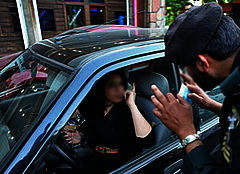Comments Are Interpreted to be ‘Green Light’ to Amoral Individuals
» Ghom Clerics Criticize President Rouhani’s Remarks:
During a speech to police commander on April 25 President Hassan Rouhani stressed that the “duty of the police was not to enforce Islam but to implement the law.” This brought forth a quick response from some clerics in the city of Ghom and also some hardline members of the Principlist group that are critical of the Rouhani’s administration and policies. The clerics said his words were a “green light to immoral individuals who were tainted with moral corruption.”
Ayatollah Nasser Makarem Shirazi, a senior mujtahed (a cleric with official followers) who supports the government said, “Recently an official had said that the duty of the police is to enforce the law not Islam. This message has three issues and was completely inappropriate. First, it implies that our laws are non-Islamic, whereas they are all from Islam and everybody, the police and non-police, have the duty of implementing them. The next issue is that such remarks weaken the morale of the police force and the efforts that are taken to strengthen ethics and morals. They waver in their duty to enforce Islamic laws. And third is that it sends a green light to impure individuals that they are free to continue their acts and that the police would not be concerned with them. These people normally create waves, watch for what they will do when they receive a green light. I hope my friendly advice is accepted and such words are not repeated in the future.”
Another clerics of the same rank, Hossein Noori Hamedani also disliked Rouhani’s remarks. He called the remarks “distracting” and said, “Our first request from our officials is that they not raise distracting issues and note that the supreme leader’s moto for the year – empathy and compassion – was meant for officials. Just yesterday the supreme leader stressed that all of us are responsible for implementing Islamic rules. The comments that the police is not responsible for implementing Islamic decrees are therefore wrong. Officials should not make remarks that convey the message that Islam and laws are two separate entities.” He also said that the constitution of the regime was based on Islamic tenets.
The third senior clerics who responded to Rouhani’s call was Safi Golpaygani who said, “The greatest pride of an organization or agency is that it is implementing the laws of Islam and the Quran.
In his talk to police officers, Rouhani had said that poverty and unemployment were the first source of instability and he categorized these to be the very acts that Islam calls nahi az monker , meaning fighting bad actions or evil. “The principal evil in society is poverty, unemployment and corruption which must be eliminated. Today we have (erroneously) confined ourselves to a few peripheral Islamic issues and think that they constitute all the bad things that Islam talks about. Fortunately, in Islam the Sharia and laws are compatible. The police does not have the duty of enforcing Islam but of the law. Otherwise it will be involved in people’s thoughts and views and that will make things difficult for people.”
He continued, “the criteria (to act) for the police must be the law. If someone breaks the law, it is your duty to act. But this must be done in a police, courteous and respectful way, particularly when dealing with the youth and women. This is an even heavier duty.”
In addition to the responses from the senior clerics, the spokesperson for the parliament’s cultural committee also objected to Rouhani’s remarks and message.
But this is not the first time that Rouhani’s remarks about the duties and work of the police are disliked by clerics and critics of the administration. Last year too when visiting the province of Khorasan, Rouhani had said, “We do not think that society will be improved through the use of vans, minibuses, the police and soldiers,” a reference to the detentions that routinely take place in cities when citizens are stopped and taken to police stations by the police because of apparent disregard or loosening of Islamic attire. Just a few months earlier too he had said, “Leave people along and let them live in peace. Do not interfere in their lives, even if you are compassionate. Let people themselves choose their way to heaven. You cannot take them there by force.”


